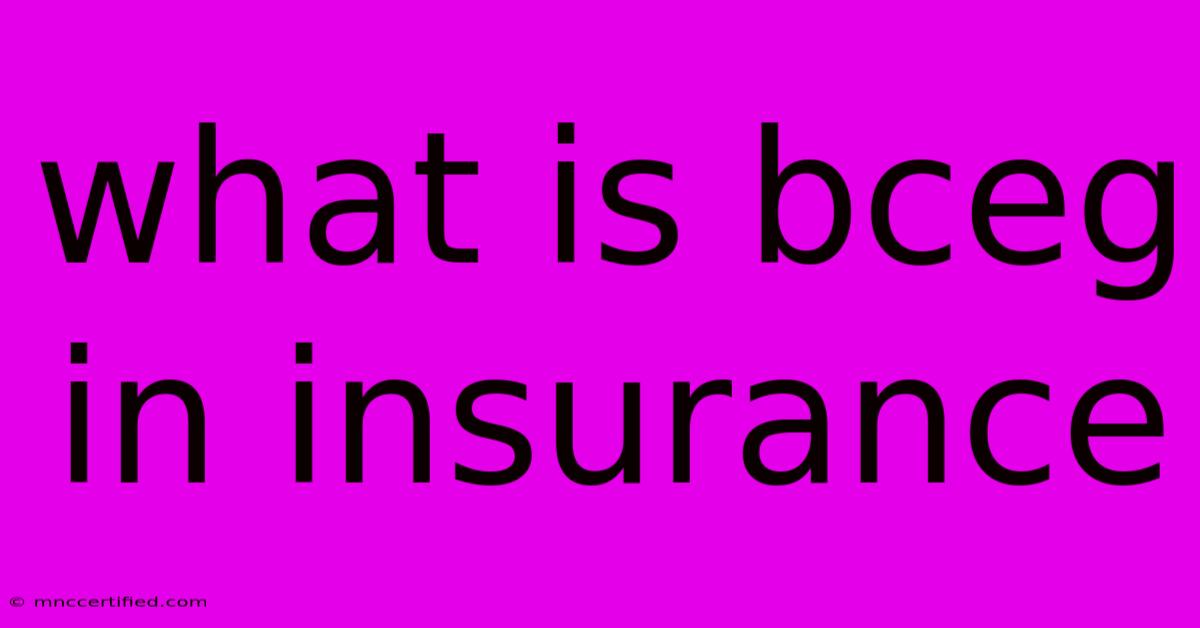What Is Bceg In Insurance

Table of Contents
What is BCEG in Insurance? A Comprehensive Guide
The term "BCEG" in insurance might seem cryptic at first, but it's a crucial acronym for understanding how insurers assess and manage risk. BCEG stands for Building, Contents, Equipment, and Goodwill. It represents the key elements of a business's physical assets and intangible value that are often insured under a commercial insurance policy. Understanding each component of BCEG is vital for business owners to adequately protect their assets.
Decoding the Elements of BCEG:
Let's break down each component of BCEG in detail:
1. Building:
This refers to the physical structure of your business premises. This includes the walls, roof, foundation, and any permanent fixtures attached to the building. Insurance coverage for the building typically protects against damage caused by various perils such as fire, windstorms, vandalism, or natural disasters. The value of your building, determined through an appraisal, will dictate the amount of coverage needed. Consider factors like building materials, age, and location when assessing this value.
2. Contents:
This covers all the personal property within your business premises that isn't permanently fixed. This encompasses a wide range of items, including furniture, computers, inventory, machinery, stock, and other equipment. The breadth of coverage can vary significantly depending on the policy, so it’s crucial to carefully review your policy wording. Accurate inventory is essential for determining the appropriate level of insurance coverage for your contents. Regular updates to this inventory are highly recommended.
3. Equipment:
While often overlapping with "Contents," "Equipment" usually refers to larger, more specialized machinery and tools crucial for your business operations. This could include industrial equipment, manufacturing machinery, specialized computer systems, or other technology vital to your business function. Ensuring adequate insurance for this category is crucial, as replacing or repairing high-value equipment can be extremely costly. Consider scheduled equipment cover for particularly valuable assets to ensure comprehensive protection.
4. Goodwill:
This is the most intangible part of BCEG. Goodwill represents the reputation and established customer base of your business. It’s the value beyond the tangible assets, reflecting the positive reputation you've built, brand loyalty, and established customer relationships. While not always explicitly covered under standard commercial insurance policies, certain policies might offer Business Interruption coverage, which can partially account for losses incurred due to damage to your goodwill (e.g., loss of revenue due to business closure).
Why Understanding BCEG is Crucial for Businesses:
Understanding BCEG is paramount for several reasons:
- Accurate Insurance Coverage: Properly assessing the value of each BCEG element ensures you have sufficient insurance coverage to protect your business from significant financial losses in case of an unforeseen event. Underinsurance can lead to devastating consequences.
- Risk Management: Identifying the assets encompassed by BCEG allows for a comprehensive risk assessment, enabling you to implement preventative measures to minimize potential losses.
- Negotiating Insurance Premiums: A clear understanding of your BCEG assets allows you to engage in informed discussions with insurance providers, potentially leading to better premium rates and suitable policy options.
- Business Continuity: Adequate insurance for all BCEG elements is crucial for business continuity after a disaster. It allows you to recover more quickly and efficiently.
Securing Adequate BCEG Insurance:
To secure the right BCEG insurance, consider the following:
- Regular Property Appraisals: Regular appraisals are essential to keep insurance coverage aligned with the current value of your assets.
- Detailed Inventory: Maintain a detailed and regularly updated inventory of your business contents and equipment.
- Consult with an Insurance Broker: A knowledgeable insurance broker can help you navigate the complexities of insurance policies and find the most suitable coverage for your specific needs.
By understanding the components of BCEG and their implications, businesses can significantly improve their risk management strategies and ensure the long-term viability of their operations. Don't underestimate the importance of this vital insurance framework.

Thank you for visiting our website wich cover about What Is Bceg In Insurance. We hope the information provided has been useful to you. Feel free to contact us if you have any questions or need further assistance. See you next time and dont miss to bookmark.
Featured Posts
-
Daniel Penny Not Guilty In Subway Chokehold Death
Dec 10, 2024
-
West Hams Potter Regret
Dec 10, 2024
-
Trove Brands Stock Symbol
Dec 10, 2024
-
765 M Deal For Baseball Star Soto
Dec 10, 2024
-
Why Did Rooney Miss I M A Celebrity
Dec 10, 2024